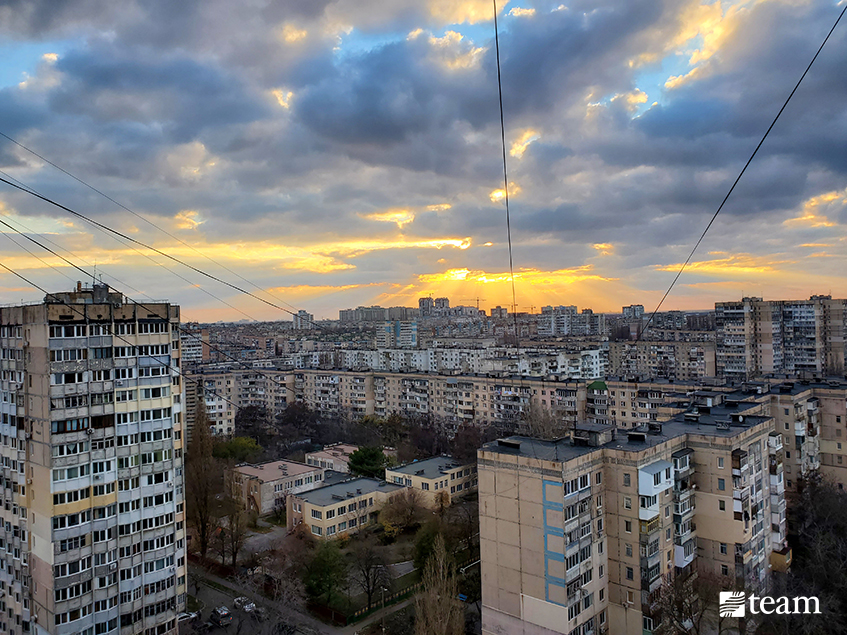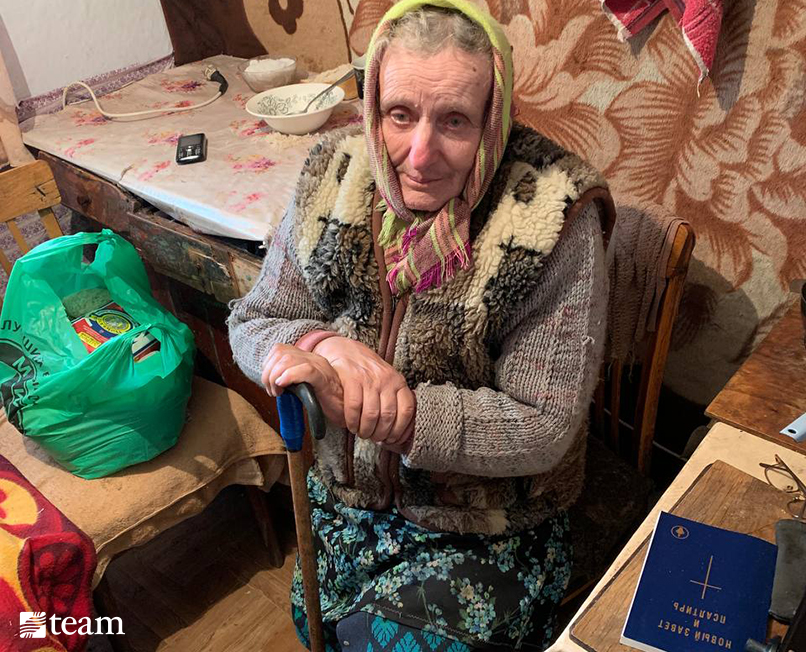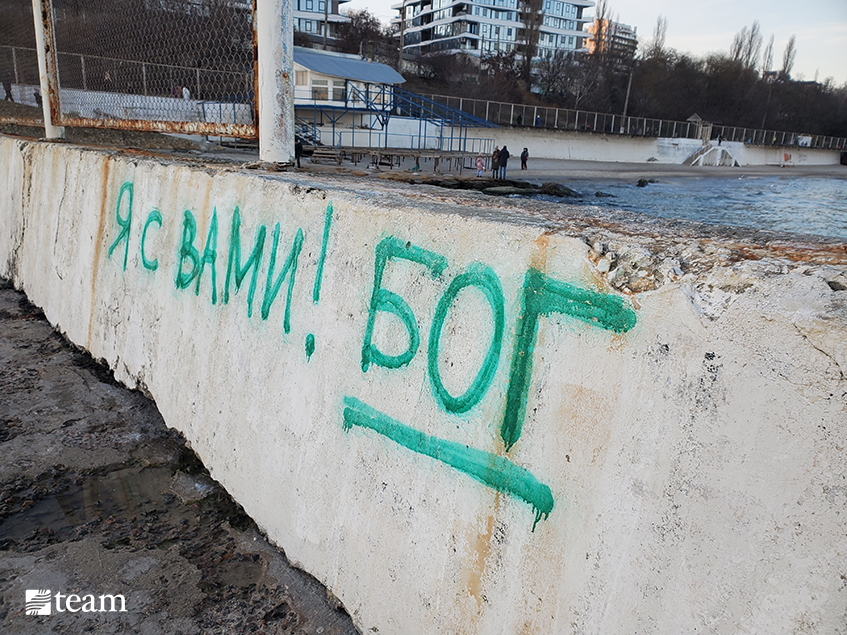
Ministry Updates
Gospel Work Continues in War-Torn Ukraine
April 12, 2022
by Suzanne Pearson

Two years ago, we braced ourselves for a pandemic that rocked the world and called the Church to prayer. Today, we have a new reason to go to our knees, this time in intercession for the nation and people of Ukraine. The Russian invasion which began Thursday, February 24 is the most aggressive act of war in Europe since World War II.
At the time of the Russian invasion, TEAM had two global workers in Ukraine, Maria* and Samantha*. Both were safely evacuated shortly before the onset of fighting but left behind churches, ministries, and Ukrainian believers they know and love as brothers and sisters in Christ.
As is the case with any war, the situation for these churches and believers changes almost daily. The updates shared here represent the most up-to-date information we can provide.
Maria’s Story
Maria’s journey to Ukraine begins in 1992. The Florida church she attended began exploring opportunities to share the Gospel in areas formerly under the yoke of the Soviet Union. Maria made a life-changing trip to Ukraine shortly thereafter and then moved there for full-time ministry in 1996 after her husband passed away.
In the years that followed, Maria was a part of three church plants in Ukraine. The third is a church in Petrovka, a town near the city of Odesa, where Maria has ministered for the last several years. Maria, along with her Ukrainian co-workers are typically busy with thriving ministries for families and youth as well as outreach to the local community. The last few weeks, however, have been anything but typical.
Rumors of War
As rumors of Russia’s possible intentions began to swirl, Maria says that the Ukrainian people dismissed the idea of an invasion. “No one believed there would be a war,” she recalls. “They said, ‘We’re friends [with Russia]. It’s not going to happen.”
Despite this optimism, it soon became clear that Maria would need to leave Ukraine, at least temporarily. She departed from her home and nation of 26 years in early February. She left behind her church family, praying that somehow disaster might be averted. However, the inescapable reality of war came to Odesa just a couple of weeks later when the Russian invasion began.
“It was very frightening for my team in Petrovka,” Maria says. “They were in shock.” At first, it seemed that all of Odesa might be the target of the early bombing raids. Thankfully the initial wave was directed only at the military bases and for the most part did not directly impact residential areas.
Maria offered up her home to co-workers as a safer location for them to stay and has continued to keep in touch with them as much as she possibly can. She says that even amid the uncertainty of each day, her Ukrainian brothers and sisters are stepping up to bring help and hope to the community.
“Some have fled,” she reports. “But many have stayed.” She says that not only are the pastor and other church leaders involved in outreach but even the youth from the church as well.
Know Us By Our Love
The greatest immediate need that the church saw was the abundance of young moms with small children home alone after their husbands and fathers were called into military service to defend their country. The women can’t get to work or to the store because it is too dangerous to venture into those areas. Children are not in school and basic living necessities of all kinds are in great demand.
And so each day the church members, including teenagers, make daily deliveries of food, toiletries and other needed items to their neighbors in need. Just 10 days into the conflict, the church had already visited and distributed supplies to over 50 families.
One example is the woman pictured below. “She lives alone and had no money for food,” Maria shares. “The day my team visited her, she was in the kitchen praying and asking God to help her. Our team gave her food, a New Testament, and prayed with her.”

Ukrainian believers in Petrovka visit their neighbors in need every day, providing tangible and spiritual care.
The outreach is making an impact, both physically and spiritually. “They’re only going to know us by our love,” Maria remarks. And the community of Petrovka is experiencing the love of Christ firsthand through these Ukrainian believers. “What I’m seeing in [the youth and leadership of the church] is that they are truly pouring out Christ’s love,” continues Maria. “They’re exhausted but they are still wanting to serve the people [of the community]. I had to leave, but they are carrying on the ministry and I’m so thankful to God for that.”
Maria is now involved in ministering to war refugees in another part of eastern Europe, wanting to stay as close to Ukraine and the people she loves as she can. As she ministers to so many broken and hurting families, she trusts that God has a purpose in all that is taking place.
“We’ve been praying [for years] for revival in Ukraine,” Maria says. “God is going to do great things. I just know it.”
Samantha’s Story
Samantha’s missionary journey began when she was only eight years old. “I’m an example of why missionaries should [visit] Sunday schools,” laughs Samantha. “I remember missionaries coming to talk in Sunday school and just sharing about how their friends were coming to know Jesus. I saw the excitement on their faces, and I had that same excitement as a second-grader. I knew from then on it was just a matter of timing.”
Samantha’s dream became a reality when she traveled to Ukraine first for a college internship, then for a short-term assignment, and then eventually to a long-term assignment in 2015 in Odesa where she remained until just weeks before the war. (Odesa encompasses a large area – Maria’s and Samantha’s churches are about a two-hour bus ride apart.)
Samantha’s ministry in Ukraine focuses on evangelism and discipleship in an international church in Odesa. As a part of that church, Samantha wears many hats, two of which are helping with youth ministry and being a part of the church worship team where she plays piano. She also helps equip Ukrainian believers to launch into cross-cultural missions themselves.
This cross-cultural training of Ukrainian believers is more important than ever, notes Samantha, because there are many parts of Europe that Americans can’t go to share the Gospel without being heavily watched by the government, but Ukrainians and other eastern Europeans can. Samantha has been a part of encouraging and equipping Ukrainians deployed into those regions. “It’s been cool to use what I’ve learned about cross-cultural adaptation to help them prepare and equip them for where they are now.”

A graffiti wall on the outskirts of Odesa reads “I’m with you! – God”
A New Reality in Ukraine
Leading up to the Russian invasion, Samantha’s experience was similar to Maria’s. TEAM leadership was considering exit plans, but what the two women were hearing from their Ukrainian community was very different. Because conflict has existed between Russia and portions of Ukraine since 2014, people assumed that the new threat was more of the same.
That all began to change in late January 2022. Each day Russia amassed more troops on the Ukrainian border. Then reality set in when Samantha’s ministry leader told her it was time to start preparing for evacuation. In early February, Samantha traveled to Poland, hoping to just “wait it out” for a couple of weeks and then return to her home. Friends in Ukraine asked why she was in Poland and insisted, “You’ll be back next week.”
Just days later, those same friends awoke to the sound of explosions. “They were blindsided. People just did not believe that this would happen. Ever.”
Since the invasion, Samantha has stayed in touch with her friends and church community through Facebook and other digital communications. Up to the time of this publication, Odesa has not been taken by Russian forces, and the bombing has been primarily limited to military targets rather than residential areas.
Still, Odesa is a port city on the Black Sea, making it a highly coveted area by Russia. Samantha shares an amazing story of God’s protection over Odesa in the early days of the war. “There was a huge storm [on the Black Sea] for about three days. During that time, Russian ships were spotted [off the coast of Odesa]. You could see them from the beach, but they couldn’t land because of the storm on the sea. Ukrainian Christians in Odesa prayed, ‘Lord, keep this storm going.’ The ships were never able to advance onto the beachhead.”
Despite the heavy and difficult reality of war weighing on Samantha’s mind, she sees God at work. “I’ve heard a million stories of how God is working in the midst of ‘the garbage’ as I call it. And that’s been the most encouraging part.”
God is at Work
One of those stories is about one of Samantha’s former youth group students who she discipled prior to leaving Ukraine. This young teenager and her family fled Odesa to stay with relatives as they contemplate their next move. The teen’s grandmother expressed interest in studying the Bible. This young lady is now taking her grandmother through the same discipleship process that Samantha used with her.
Samantha sums it up beautifully: “It’s just the kindness of God that He’s getting a hold of people’s hearts.”
Samantha continues to minister to people affected by the war in various ways. “The hardest part is just watching and praying, waiting, trying to be helpful, connecting friends to places that are safe, helping refugees in any way I can,” says Samantha. Still, her heart is to return to Ukraine if the Lord allows. “I know that I might not be able to go back, but my heart wants to go back. That’s my home.”
Other updates
- Since the invasion, TEAM connected with and is assisting a national pastor in Ukraine whose church is located in the heart of the fighting. “Pastor E” reports that his congregation has been miraculously kept safe from harm despite heavy shelling, and 30 unbelievers in the community have come to know the Lord since the war began.
- TEAM is partnering with multiple organizations to provide food, medicine, and other supplies to those sheltering in Ukraine.
- Several TEAM ministry areas in Europe are ministering to refugees and others affected by the war. Upcoming TEAM communications will highlight the needs of these neighboring regions.
*Names changed for security reasons.
Related articles


